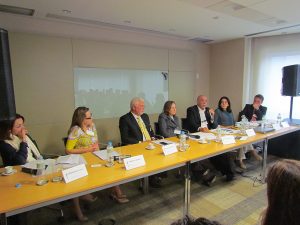At the end of October, President Dilma Rousseff was re-elected with 51,6% of the vote, in the tightest victory in electoral history. In her opening statement, the president promised to strengthen partnerships with various sectors. ETCO compiled the positions expressed during the president's campaign on the issues it advocates. Check out what the government thinks about them:
Reduction of tax evasion
Tax evasion was treated in a generic way in the set of proposals to simplify the tax system. In her government program, Dilma promised to advance “in reducing the bureaucracy of business processes and procedures, including tax simplification”. According to a 2012 study by the Latin Trade Group, Brazilian companies spend 2.600 hours to determine and collect taxes. “Simplification is important because, when it is difficult to remain legal, tax evasion is encouraged,” says Evandro Guimarães, ETCO's chief executive. Even with the country making little progress in simplification, the siege of tax evaders has become stronger. The adoption of the Electronic Invoice (NF-e), in addition to the increasing computerization of federal and state tax authorities, has contributed to making tax evasion more difficult. More specific measures, such as simplifying tax collection, which could reduce tax evasion have not been addressed in depth.
Modernization and simplification of the tax system
Regarding the tax issue, the president will face the challenge of implementing more effective measures than those taken so far. The president has been betting on specific exemption and simplification measures, which reduced the weight of the tax burden by R $ 100 billion, according to the Federal Revenue Service. However, they were not enough to leverage economic growth. Despite this, there is no sign that the strategy of making specific reforms will change over the next four years. The government should announce measures to simplify PIS, Cofins and ICMS later this year. According to the proposal, the ICMS rates would be unified and a tax credit would be created generated on the purchase of certain inputs, which would allow the deduction of PIS and Cofins from other taxes.
Stimulating the market economy
As soon as Dilma Rousseff was re-elected, the confidence of investors downward manifested itself in the fall of the stock market and in the rise of the dollar, which shows that the market wants a clear signal from the president about economic policy. It is also expected that a “pragmatic” team will be appointed to give investors the confidence they need to make investments. In recent months, in the face of signs of deceleration, the government has bet on exemptions granted to specific sectors in order to leverage the rest of the economy. The formula does not seem to have worked, since the predicted growth fluctuates by 1%. Credit, employment and income are stagnant. Inflation is at the ceiling of the target. The collection will hardly reach its goal in 2014. In her government program, the president understands that economic development is directly related to productivity. "Its increase will be due to the modernization of the Brazilian industrial park, the improvement in the business environment and the greater training of companies and qualification of the workforce", says the text. In the document, the government promises an uncompromising defense of the economy. Another priority is to continue social policies. In addition, promoting economic growth by stimulating competitiveness and improving the educational level.
Protection of intellectual property and combating smuggling
The protection of intellectual property and the fight against smuggling, piracy and counterfeiting have eluded the electoral debate. However, Dilma's government plan includes measures that address these issues indirectly. The main one is to strengthen border policing, with joint efforts by federal and state agencies, to curb the entry of arms, drugs and illegal products. In addition, the government says it will equip the Federal Police and Federal Highway Police, without detailing, however, investments and priorities.
Fighting corruption and improving the institutional environment
In the second round, Dilma announced a package with five measures to improve the fight against corruption. Among them, hardening the penalties against box 2, making enrichment a crime, speeding up proceedings in a privileged forum, speeding up processes of embezzlement of public resources and creating a legal device to confiscate illegally obtained goods. Three of these five measures were already included in bills in Congress. In the anti-corruption agenda, Dilma's program proposes to increase transparency through the Digital Government portal, to equip internal control bodies and to stimulate the creation of anti-corruption mechanisms in states and municipalities. The agenda also includes political reform and the expansion of popular participation in the government.
(With information from the newspapers O Estado de S. Paulo, Folha de S. Paulo, Valor Econômico, Bom Dia Brasil, Veja Online Portal and the Government Program of Dilma Rousseff)






